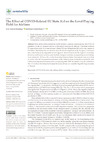Please use this identifier to cite or link to this item:
https://accedacris.ulpgc.es/jspui/handle/10553/114316
| DC Field | Value | Language |
|---|---|---|
| dc.contributor.author | Martin Domingo, L. | en_US |
| dc.contributor.author | Martín Hernández, Juan Carlos | en_US |
| dc.date.accessioned | 2022-04-08T07:54:24Z | - |
| dc.date.available | 2022-04-08T07:54:24Z | - |
| dc.date.issued | 2022 | en_US |
| dc.identifier.issn | 2071-1050 | en_US |
| dc.identifier.uri | https://accedacris.ulpgc.es/handle/10553/114316 | - |
| dc.description.abstract | State aid for airlines around the world has been a common practice during the COVID‐19 pandemic, as the air transport was one of the sectors most heavily affected. This study analyzes 27 cases of state aid to EU airlines between 1 March 2020 and 30 September 2021 with a total amount of €85 billion. The information was obtained from the area of competition of the European Commission (EC), which is the entity responsible for final approval. Results indicate that the largest EU economies (Germany and France), as well as some Northern European countries, are supporting national airlines more extensively. Airlines with a weaker financial performance before the pandemic were more likely to receive state aid. Government involvement in the airline industry during the recent health crisis will have an important influence on the level playing field (LPF) for airlines. It is still unclear how this will evolve in the future, but it seems that some airlines now resemble the public flag companies of the past. | en_US |
| dc.language | eng | en_US |
| dc.relation.ispartof | Sustainability | en_US |
| dc.source | Sustainability [ISSN 2071-1050], v. 14 (4), 2368, (2022) | en_US |
| dc.subject | 531212 Transportes y comunicaciones | en_US |
| dc.subject.other | COVID-19 | en_US |
| dc.subject.other | EU state aids | en_US |
| dc.subject.other | Airlines | en_US |
| dc.subject.other | Airline ownership | en_US |
| dc.subject.other | Competition | en_US |
| dc.title | The effect of COVID-related EU state aid on the level playing field for airlines | en_US |
| dc.type | info:eu-repo/semantics/Article | en_US |
| dc.type | article | en_US |
| dc.identifier.doi | 10.3390/su14042368 | en_US |
| dc.identifier.scopus | 2-s2.0-85125092823 | - |
| dc.identifier.isi | WOS:000769007800001 | - |
| dc.contributor.orcid | #NODATA# | - |
| dc.contributor.orcid | #NODATA# | - |
| dc.identifier.issue | 4 | - |
| dc.investigacion | Ciencias Sociales y Jurídicas | en_US |
| dc.type2 | Artículo | en_US |
| dc.utils.revision | Sí | en_US |
| dc.identifier.ulpgc | Sí | en_US |
| dc.contributor.buulpgc | BU-ECO | en_US |
| dc.description.sjr | 0,664 | - |
| dc.description.sjrq | Q1 | - |
| dc.description.miaricds | 6,1 | - |
| item.fulltext | Con texto completo | - |
| item.grantfulltext | open | - |
| crisitem.author.dept | GIR TIDES: Investigación en Turismo y Transporte | - |
| crisitem.author.dept | IU de Turismo y Desarrollo Económico Sostenible | - |
| crisitem.author.dept | Departamento de Análisis Económico Aplicado | - |
| crisitem.author.orcid | 0000-0002-2950-2405 | - |
| crisitem.author.parentorg | IU de Turismo y Desarrollo Económico Sostenible | - |
| crisitem.author.fullName | Martín Hernández, Juan Carlos | - |
| Appears in Collections: | Artículos | |
SCOPUSTM
Citations
10
checked on Jun 8, 2025
WEB OF SCIENCETM
Citations
9
checked on Jan 12, 2026
Page view(s)
145
checked on Jan 9, 2026
Download(s)
100
checked on Jan 9, 2026
Google ScholarTM
Check
Altmetric
Share
Export metadata
Items in accedaCRIS are protected by copyright, with all rights reserved, unless otherwise indicated.
